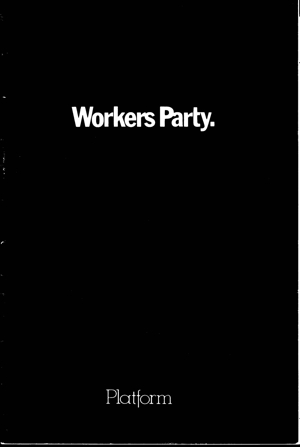
A group of founders and early supporters of Australia’s first “libertarian party” – provocatively and toungue-in-cheek perhaps called the “Workers Party” – are getting together later this month for a “Reunion”. To encourge discussion and reflection on those tumultuous years nearly half a century ago I have listed below some of my recent blog posts and other contibutions to the liberty movement.
Some Thoughts on the Name
An attempt at ideological reclamation
Some of us thought that it was wrong that communists, socialists, and nazis had claimed the exclusive right to speak on behalf of “the workers” and so felt they were entitled to use the word “worker” in the name of their political parties. Something similar could be said about “labour” (or “labor”) and the parties which claimed to speak on behalf of those who “laboured”. CLs and libertarians believed that all workers and labourers should be represented politically, whether they worked with their hands, or their minds, or other organs (such as their voice (singers), their tongues (wine tasters), or their fingers (guitarists and pianists)).
An assertion that there was an alternative theory of class exploitation
There was also a not so subtle dig at the socialist idea of expolitation of the working class (those who worked with their hands) who were paid a wage by a “capitalist class” who took some of their wage as a form of “unearned income” or “profit”. We were aware that there was an alternative theory of class, a “classical liberal theory of class analysis” as it were, which was based on the idea that there were only two ways in which wealth could be acquired, either by
- the “economic means”, i.e. producing it oneself or exchanging the things one produced voluntarily with others, in other words via the free market, or
- the “political means”, whereby one took by force the wealth produced by others, usually with the assistance of the state. (Note: this distinction was made by Franz Oppenheimer in The State (1908).)
Thus, the aim of the WP was to attempt to place a limit (or completely abolish) the power of the state to take the wealth produced by all kinds of “workers” and “labourers”, and to thus allow the complete freedom of all individuals to produce and exchange the products of their work, and most importantly to keep any profits they had legitimately made (i.e. non-coercively).
The temptation to blame the name for the WP’s political failure
After the disappointing results of the 1975 election, and later ones as well, many in the party placed the blame on the name, which it was thought, “confused” the voters. Hence the move to eventually change the name to the more anodyne “Progress Party”. In my view, the original name was deliberately provocative and opened the way for interesting discussions with sympathetic voters about the nature of politics and free markets, the nature of exploitation, and who exploited whom. The underlying reason for the failure of the WP then and for people in the liberty movement today, is that most people have deeply ingrained views which are fundamentally opposed to CL/libertarianism, and thus the formal name of the political party is a bit beside the point. These views in my opinion are the following:
- people do not value individual or economic liberty highly, preferring instead things like “equality”, “diversity,” “inclusion”, “sustainability”, “safety,” etc.
- people want to get something for nothing (i.e. to force other people to pay for it), they expect politicians to provide them with these “free” things (hence the existence of elections), and see nothing wrong with politicians and bureaucrats using the powers of the state (force, coercion) to do this
- people have a very exaggerated idea of the extent of and reasons for “market failure” and thus the need for government regulation or provision of goods and services
- people have barely (if any) idea of how pervasive, profound, and pervasive “government failure” is now and has been historically
- there is massive public ignorance of basic economic ideas
Until these five impediments to the spread and public acceptance of these ideas are weakened and (I hope) eventually removed it doesn’t matter what we call our political party.
In a blog post (listed below) I half jokingly described an emerging anti-political group in the last election, the “Negative Political Party.”
The recent legal stuggles of the Liberal Democrat Party over who is entitled to use the name “Liberal” shows that this is an issue that will not go away.
Some Posts and Online Texts to consider
See in general my blog site “Reflections on Liberty and Power” and my website “The Digital Library of Liberty and Power” – an overview and recent additions.
On the Workers Party in particular:
On the current state of the liberty movement and the threats we face:
- “The Work of Sisyphus: the Urgent Need for Intellectual Change” (25 April, 2020) here
- “The State of the Libertarian Movement after 50 Years (1970-2020): Some Observations” (25 March, 2021) here
- “A List of Posts on the Current State of Liberty and the Threats it faces” (5 July, 2022) here; in particular:
On liberty and liberalism in Australia:
- “Liberty in Australia and the Asia-Pacific Region” (5 July, 2022) here
- “The Negative Political Party” (11 July, 2022) here
- On the “Linoleum Party” (LINO): “The Incoherence and Contradictions inherent in Modern Liberal Parties (and one in particular)” (21 Oct. 2021) here
- “The Myth of a liberal ‘Australian Way of Life’” (20 June 2021) here
Some works by Australian CLs/libertarians I have put online:
- overview page
- “the Australian Frédéric Bastiat” William Edward Hearn (1826-1888)
- the radical liberal Bruce Smith (1851-1937)
- my online version of the WP platform (1975)
My series on “The Classical Liberal Tradition: A Four Hundred Year History of Ideas and Movements” (24 Oct. 2021; updated: 25 Apr. 2022) here
